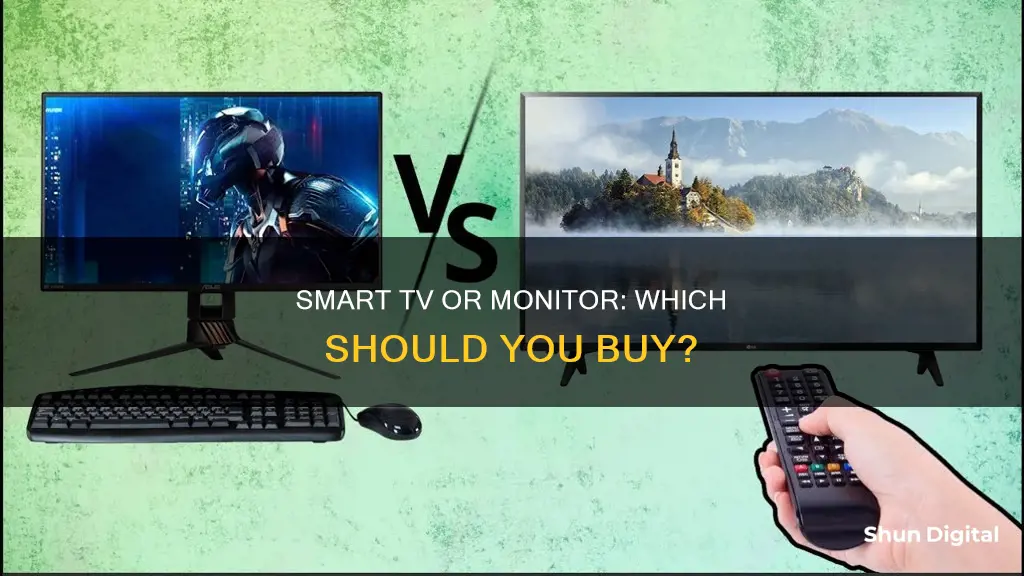
Smart TVs and smart monitors are both screens that offer internet connectivity, built-in applications, and streaming capabilities. While they share many similarities, there are some key differences to consider when deciding which one to buy. Smart TVs are larger and designed for entertainment in living rooms or home theaters, while smart monitors are more compact, versatile, and suitable for various settings, including home offices and bedrooms. Smart TVs offer higher resolutions like 4K, resulting in superior viewing experiences, while smart monitors provide high-definition displays but may not reach the same resolution as top-tier smart TVs. Smart monitors are typically more affordable, making them a cost-effective option for those who want smart functionality. If you have a spacious living room and desire a cinematic experience, a smart TV is ideal. However, if you have limited space and need a versatile display for work and entertainment, a smart monitor is a better choice.
What You'll Learn
- Smart TVs are larger and more expensive, but monitors are better for gaming
- Smart TVs are ideal for cinematic experiences, while smart monitors are more versatile
- Smart monitors are more budget-friendly and compact
- Smart TVs are best for streaming services and can replace cable
- Smart monitors are great for light gaming, streaming, and working

Smart TVs are larger and more expensive, but monitors are better for gaming
Smart TVs and smart monitors both offer high-resolution visuals and built-in streaming capabilities. However, they differ in several key areas, including size, price, and performance, which may influence your decision to opt for one over the other.
Smart TVs are typically larger, ranging from compact 32-inch models to sizes over 75 inches, making them ideal for a cinematic experience in spacious living rooms or home theatre setups. On the other hand, smart monitors are more compact, usually ranging from 24 to 32 inches, making them versatile for various settings like home offices and bedrooms. The larger screen size of smart TVs often comes at a higher cost, making them more expensive than smart monitors.
While smart TVs offer higher resolutions like 4K, smart monitors may not reach the same level of resolution, although some can offer competitive resolutions. Smart monitors excel at multitasking, allowing you to use them as computer displays, split the screen for multiple applications, and still access streaming content. They are also ideal for gaming, offering specialised gaming modes, faster refresh rates, and lower input lag, resulting in a smoother gaming experience. Smart TVs, however, may experience slowness and higher input lag, making them less responsive for gaming.
If you're looking for a display for console gaming or streaming services, a smart TV could be a suitable option due to its larger screen size and affordable price. In contrast, if you require a versatile display for work and entertainment, prefer a budget-friendly choice, or prioritise gaming performance, a smart monitor might be the better choice.
Understanding ASUS CPU Temp Monitoring: What's Really Going On?
You may want to see also

Smart TVs are ideal for cinematic experiences, while smart monitors are more versatile
Smart TVs and smart monitors both offer streaming capabilities and high-resolution displays. However, they are designed for different purposes and have distinct advantages. Smart TVs are ideal for cinematic experiences, while smart monitors are more versatile.
Smart TVs are designed for immersive viewing experiences, especially in larger spaces like living rooms or home theatres. With screen sizes ranging from 32 inches to over 85 inches, they provide a cinematic feel for movies, TV shows, and sports. They offer higher resolution options, such as 4K or even 8K, delivering stunning clarity and detail. Smart TVs also integrate online services, allowing direct streaming from platforms like Netflix without the need for external streaming devices. Their advanced operating systems and voice control features further enhance the user experience.
On the other hand, smart monitors are highly versatile and suitable for various settings, including home offices, bedrooms, and smaller spaces. They typically offer smaller screen sizes, ranging from 24 to 32 inches, making them ideal as secondary displays or for use with computers and gaming consoles. While smart monitors may not reach the same resolution heights as top-tier smart TVs, they still provide high-definition visuals and competitive resolutions, colours, and clarity. For instance, some Samsung smart monitors offer 4K resolution and 99% sRGB colour volume, producing millions of colour combinations.
Smart monitors excel in multitasking, allowing users to split the screen for multiple applications while still accessing streaming content. This makes them perfect for those who use their screens for both work and entertainment. Additionally, smart monitors often have specialized gaming features, such as fast refresh rates and low input lag, making them a favourite among gamers. They are also more budget-friendly than smart TVs, providing a cost-effective option for those seeking smart functionality.
While smart TVs focus on delivering a superior viewing experience, smart monitors offer flexibility, multitasking capabilities, and enhanced gaming features. The choice between the two ultimately depends on the user's specific needs and space considerations. If you seek a cinematic experience in a spacious room, a smart TV is ideal. However, if you require versatility, a compact option, or a budget-friendly choice for work and entertainment, a smart monitor is the way to go.
Folding Your ASUS Monitor Stand: A Step-by-Step Guide
You may want to see also

Smart monitors are more budget-friendly and compact
Smart monitors are a great option if you're looking for a budget-friendly and compact alternative to a smart TV. They offer a range of features that make them a versatile choice for various settings, including home offices and bedrooms.
One of the key advantages of smart monitors is their affordability. They tend to be more cost-effective than smart TVs with similar features. If you're looking for a budget-friendly option without compromising on functionality, a smart monitor is a perfect choice. Their compact size also contributes to their affordability. With sizes typically ranging from 24 to 32 inches, they are ideal for smaller spaces.
The smaller size of smart monitors makes them highly versatile. They can be easily set up on a computer desk or stand, making them a great addition to a home office setup. Their compact design also allows for more flexibility in terms of placement, and they can be used as a secondary display for your computer or gaming console. Despite their smaller size, smart monitors still offer high-definition visuals and streaming capabilities, making them a convenient all-in-one solution.
Smart monitors also excel in multitasking. They can be used as computer displays, allowing you to run multiple applications simultaneously. You can split the screen for different applications while still accessing streaming TV content. This feature is particularly beneficial for those who use their screens for both work and entertainment.
Additionally, smart monitors are designed with gaming in mind. They often offer specialized gaming modes and features like fast refresh rates and low input lag, making them a favorite among gamers. Their smaller size also means that you won't experience the same level of slowness that you might encounter with a larger smart TV.
In summary, smart monitors offer a budget-friendly, compact, and versatile alternative to smart TVs. They are perfect for those who need a display for work, entertainment, or light gaming, without taking up too much space. With their high-definition visuals, streaming capabilities, and multitasking features, smart monitors provide a convenient and affordable solution for various settings.
Electricity Usage: Monitored by Companies or Not?
You may want to see also

Smart TVs are best for streaming services and can replace cable
Smart TVs are internet-enabled and come with built-in applications, allowing you to stream content directly from platforms like Netflix, Hulu, and Amazon Prime. This makes them a great alternative to cable television, as you can access a wide range of entertainment options without the need for a cable or satellite connection.
Smart TVs offer advanced operating systems and include both free and paid streaming apps, providing a blend of traditional television and computer functionalities. They have done away with the need for cable connections, as streaming apps provide a wide array of entertainment options. With a smart TV, you can directly access popular streaming platforms and enjoy your favorite shows and movies without the need for any external streaming devices. This makes them a convenient and cost-effective option for those looking to cut the cord and streamline their entertainment setup.
The integration of online services and streaming apps on smart TVs enhances their functionality and makes them a versatile option for viewers. Smart TVs also come in various sizes, ranging from compact 32-inch models to larger sizes like 75-inch or even 85-inch options. This size variety ensures that you can find a suitable smart TV regardless of your space constraints or desired viewing experience.
Additionally, smart TVs offer stunning visuals with 4K TV resolution options, providing exceptional clarity and detail for your favorite movies and shows. They also support voice control, enhancing your overall viewing experience and making them a compelling choice for those seeking a modern and feature-rich entertainment solution.
With the majority of American homes now adopting smart TVs, it's clear that they offer a compelling set of features that cater to the needs of modern viewers. The convenience of streaming services, coupled with the enhanced viewing experience through advanced technologies, makes smart TVs an attractive option for those looking to upgrade their home entertainment setup.
Signs Your Monitor is Failing and Needs Replacing
You may want to see also

Smart monitors are great for light gaming, streaming, and working
Smart monitors are a great choice if you're looking for a display that can handle light gaming, streaming, and working. They offer a range of features that make them a versatile option for your home or office setup.
One of their key advantages is their compact size, making them ideal for smaller spaces. Their smaller dimensions also make them suitable as a secondary display for your computer or gaming console. For instance, the Samsung M50B 32″ LED FHD Smart Monitor is a great option, offering effortless streaming and remote access to another PC. Additionally, smart monitors provide a larger display than most laptops, making them perfect for when you need to focus on work or want to view content on a bigger screen.
Smart monitors also excel in multitasking. You can use them as computer displays, split the screen for multiple applications, and still access streaming TV content simultaneously. This feature is especially beneficial for those who use their screens for both work and entertainment. They also offer streaming apps on the main screen, providing easy access to your favourite streaming services.
When it comes to gaming, smart monitors deliver a smooth experience for light gaming sessions. They typically have a refresh rate of around 60Hz, which is suitable for most low-level gaming. Some smart monitors even offer specialised gaming modes and features like fast refresh rates and low input lag, making them a favourite among casual gamers.
In terms of connectivity, smart monitors are designed to work with computers and may have fewer ports than smart TVs. They usually have one or two HDMI ports or a micro-HDMI port and a USB input, allowing easy connection to your laptop or desktop.
Smart monitors are also budget-friendly, providing a cost-effective way to enjoy smart functionality. They are often more affordable than buying a separate monitor and PC, making them an excellent choice for those conscious about their spending.
Connecting HP G72 to an External Monitor: Easy Steps
You may want to see also
Frequently asked questions
A smart TV is a television that has internet connectivity, voice control, and built-in applications. It is a blend of a traditional television and a computer. This integration of online services allows you to stream content from platforms like Netflix, Hulu, and Amazon Prime directly on your television.
A smart monitor is a hybrid device that combines the features of a computer monitor and a smart TV. Smart monitors are smaller in size, making them ideal for use as a secondary display for your computer or gaming console. They are also more budget-friendly compared to smart TVs.
The main differences lie in their size, resolution, connectivity, and multitasking capabilities. Smart TVs are larger and offer higher resolutions like 4K, while smart monitors are more compact and may not have the same level of resolution. Smart TVs have more connectivity options, while smart monitors have fewer ports and are primarily designed for use with computers. Smart monitors excel at multitasking and are great for both work and entertainment.
The choice depends on your specific needs and space considerations. If you have a spacious living room and want a cinematic experience, a larger smart TV with 4K resolution is recommended. If you are short on space and need a versatile display for work and entertainment at a budget-friendly price, a smart monitor is a better option.







